Welcome to "Rostrum of Asclepius", the quarterly journal for nurses and other health care professionals. The journal is published by the department of Nursing, University of West Attica, Athens, Greece. All articles are peer reviewed and published in Greek, including an english abstract.
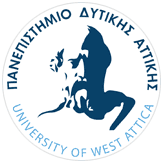
Evanthia Boutzeti , Ioannis Apostolakis , Pavlos Sarafis
ABSTRACT
Background: Combination antiretroviral therapy (cART) is a strong way to treat the new Human Immunodeficiency Virus (HIV) infectious disease. In particular, Pre-Exposure Prophylaxis (PrEP) medication is administered before exposure to virus and produces spectacular results, thus saving numerous human lives.
Purpose: This article analyses the position of Greece in relation to the epidemiology of HIV virus in the last decade compared to other European countries, paying particular attention to the objectives of the United Nations Organisation (UNO). In addition, it refers to the barriers faced by people infected with HIV, the implementation of PrEP treatment and the strategies to overcome those barriers.
Material and Method: An English language literature review on Scopus, Pubmed and Google Scholar international databases became by using the below keywords.
Results: Antiretroviral therapy constitutes a new preventive measure, before or after exposure, against HIV transmission. Although Greece has partially achieved the UNO desired objectives in 2020 in terms of HIV diagnosis and treatment, a great deal of effort is still required to fully achieve them. Unfortunately, the barriers during PrEP treatment are multiple but the multifaceted approach to the issue, combined with efficient interventions and strategies of governments and our overall behaviour, may overcome them.
Conclusions: AIDS elimination, together with the timely implementation and administration of best combination antiretroviral therapies (cART), contributes to the restriction or termination of global HIV epidemic.
Keywords: infection, AIDS, PrEP medication, barriers, strategies emotional regulation
Vaia Mpanti , Charalampos Platis
The Personal Doctor and his special contribution to the operation of Primary Health Care (PHC) was very early noticed worldwide. In most European countries, health care models have been implemented and operated effectively, based on the Personal Doctor who has a health advisor function, directing the patient to specialists or to hospital care. In Greece, the regulation in question constitutes a challenge. Even since 1983, the date of establishment of the National Health System (ESY), many multiple legislative efforts have been made, but none so far has been implemented fully, organized, and in a consistent way. The current attempted reform under Law 4931/2022 hopes to amend all these nonfulfillments and aims at establishing the Personal Doctor and reinforcing PHC. The aim of this article is to substantiate by means of bibliographic reviews the necessity and the significance of the Personal Doctor regulation in Greece and to present a realistic implementation plan in the Health Center of Neos Kosmos. This plan was created by following the 7 basic planning steps, considering the results of a typical SWOT Analysis. This analysis identifies the strengths and weaknesses of the Health Center of Neos Kosmos, as well as the opportunities and threats which have emerged from the analysis of its external environment. This article comprehensively emphasizes the need of implementation of this regulation in Greece, a difficult and demanding endeavor, the success of which will be ensured only and if only the necessary prerequisites are created- the most significant of which is the continuity in the shaping of health policies and the common political will.
Keywords: personal doctor, primary healthcare, swot analysis
Aggeliki Kiranoudi , Georgia Toylia
ABSTRACT Lung cancer accounts for about 34% of cancer deaths in men and 23% in women. It is a serious disease and, for about 85% of patients, the diagnosis is made when they are in stage 3 or 4 of the disease, as lung cancer progresses silently and only when it has already spread does it cause problems for the patient that lead to doctor. It has a metastatic form, having as its source the cells of the lung and can be caused by either genetic or environmental factors. Its timely diagnosis by the medical staff offers the patient better survival rates. Depending on the stage of the cancer, the appropriate treatment is chosen - surgical removal, chemotherapy and/or radiation therapy. The main goal of any therapeutic approach is the patient's quality of life combined with the effectiveness of the treatment. The main symptoms are cough, pain in one area of the chest or localized to one or more sides, fatigue, weakness and unexplained weight loss. Quality of Life (QoL) refers to various dimensions of a person's daily life, such as their functionality, their well-being as well as the general perception of their health at a physical, psychological and social level. Most literature studies report that the quality of life in patients with lung cancer is lower than in the healthy population. In addition, it seems that men show a higher quality of life in terms of social and psychological aspects than women.
Keywords: quality of life, lung cancer, treatment
Ioannis Kouris , Georgia Toylia
ABSTRACT
The modern lifestyle is one of the factors that determine the possibility of colon cancer. While death rates from colorectal cancer have declined since the early 1970s as a result of earlier detection and better treatment, it remains the third most common cancer in both men (after lung cancer and prostate cancer) and in women (after breast cancer and lung cancer), but also the second most common cause of cancer death overall. If colon cancer is diagnosed at an early stage, the five-year survival rate increases to 93%. In particular, the type of this cancer is linked to lifestyle and environmental factors such as: diet, obesity, physical activity, alcohol and tobacco, oral contraceptives and other medications, family history.
The treatment approach to colon cancer depends on the location and stage of the cancer, as well as the general health and dietary preferences of the patient. The earlier it is diagnosed, the more effective its removal. The main goal of any therapeutic approach is the patient's quality of life combined with the effectiveness of the treatment. Quality of Life (QoL) refers to various dimensions of a person's daily life, such as their functionality, their well-being as well as the general perception of their health at a physical, psychological and social level. Its assessment, however, becomes difficult because it depends on the beliefs and perceptions of the individual as well as on the personal assessment of his situation. Therefore, the individual's quality of life can be defined as the perception of his position in the society he belongs to and also of the value system of this society, in combination with his goals and expectations.
Keywords: Quality of life, colon cancer, treatment
Athanasios Anadiotis , Theodore Kapadochos
For a large part of humanity, religion is very important in promoting one's health. Religious beliefs and practices provide not only a sense of meaning in people's lives, but are also an important source of rules for right (moral) behavior. Spirituality is more difficult to define; it is a broader concept that is not limited to religious traditions. Spirituality can be seen as an individual experience characterized by a search for the meaning of life and a relationship with the sacred that does not need to be associated with formal religious communities and institutions. Healthy lifestyle, social support, religious practices, spiritual direction, way of dealing with problems that arise in one's life, values and positive emotions are concepts/dimensions that are directly related to one's religiosity/spirituality. Frequent participation in religious activities can lead to risk factors modification that contribute to the manifestation of life-threatening diseases and the change of the person's lifestyle (reducing or even quit smoking, avoiding systematic alcohol consumption, increasing physical activity). Prayer as a very important part of religious activities can improve stress levels and encourage the person to have a healthy lifestyle and a very important social support. Health policy makers should pay special attention to the special group of patients with cardiac problems and adopt spiritual care policies and strategies in the health care system.
Keywords: Religiosity, Spirituality, health
Marina Κatsantridou , Evika Karamagioli , Emmanouil Pikoulis
ABSTRACT
Introduction: The pandemic brought about changes in the operation of the nursing departments. Staffing problems arose that required immediate resolution but also effective communication problems due to personal protection measures.
Purpose: The purpose of the present study was to investigate the functionality of the nursing team and possible communication barriers due to Personal Protection Measures. Additional objectives related to perceptions of vaccination and barriers to departmental functioning due to it.
Material and Methods: The total sample consisted of 42 nurses and 36 nurses' assistants working in the Covid-19 wards at Alexandroupoli hospital. Data were collected from February to March 2022 by questionnaire, in paper form and in an online form. The statistical analysis was done with the SPSS program (IBM Corp. Released 2019, IBM SPSS Statistics for Windows, v.26.0, Armonk.
Results: The working group of nurses with permanent and auxiliary staff maintains good interpersonal relations, but the lack of training of the auxiliary staff does not inspire confidence in 57.1%. The work of the supervisors is recognized with positive opinions in a percentage of >90%, the mandatory vaccination and the suspension of work burdens the operation of the hospital, while a small percentage, 28.6% of the nurses have negative return attitudes towards non-vaccinated colleagues. 74% of nurses state that PPE causes difficulty in breathing and in their work in a percentage of 42.9%.
Conclusions: The results of the study indicate that the use of PPE causes difficulties at the individual and work level. Hospitals in a period of health crisis need the existence of experienced staff, while good, effective communication and cooperation between permanent and auxiliary staff does not fully contribute for all nurses to the good operation of the nursing departments.
Keywords: COVID-19 pandemic, vaccination, personal protective equipment, communication, nurses team
Nikoleta Nteli , Chrysoula Tsiou , Eugenia Vlachou , Georgia Gerogianni , Christos Constantis , Sotirios Plakas
Introduction: The rapid spread of the Covid-19 pandemic has resulted in the infection, severe disease and death of millions of people worldwide. Fear of infection and severe disease and pandemic containment measures such as quarantine changed the daily habits of citizens with negative effects on the physical and mental health of them. Aim: The aim of this study was to document the changes in the daily life habits of citizens of a provincial city during the Covid-19 pandemic period, which habits are associated with the development of diabetes. Material and Methods: A cross-sectional was conducted using a questionnaire constructed after a literature review and distributed in paper and electronic form (google forms). Snowball sampling was used. Results: The study sample consisted of 170 adult citizens (age >18 years). Results showed that habits that changed during the pandemic and were associated with an increased risk of developing diabetes were coffee consumption (increase), sleep duration (decrease), physical activity (decrease in duration), smoking (increase), duration of mobile phone use (use) and stress level (increase). It was also found that better health habits during the pandemic period were associated with better health status of participants (p=0.008). Conclusions: People's daily habits were modified during the pandemic by both fear of the disease and restrictive protective measures. These changes are associated with an increased risk of developing diabetes and appropriate preventive measures should be promoted when designing health policies.
Keywords: Diabetes, quarantine, protective measures, pandemic, habits, COVID-19
Evangelos Aliferis , Tina Garani-Papadatou
ABSTRACT
Introduction: Cancer remains a leading cause of death, with 10 million deaths recorded in 2020. Ineffective cancer pain management is a significant problem associated with the disease.
Objective: To investigate the role of the pharmacist in cancer pain management.
Method: Literature search: pharmacist, pain relief, palliative care, pain management, human rights, public health, cancer, advanced and terminal stage, new technologies, off-label. As a time, frame twenty years was set as a sufficient period. The search language was determined to be English and from world-renowned search engines for scientific topics and articles (Pubmed, Medline), world-renowned organizations (such as WHO and IASP).
Results: Most articles focus on the interdisciplinary role of pharmacists in palliative care. A smaller number of articles refer to policy and education issues, off-label drug issues, and personalized treatment issues.
Conclusions: Pharmaceutical science and the pharmacist have a leading role in the effort to manage cancer pain better and to provide better quality palliative care. To fulfill this, policies must be developed in which the pharmacist would be an integral member of the interdisciplinary team.
Keywords: pain management, human rights, pharmacis, cancer pain, palliative care, public health
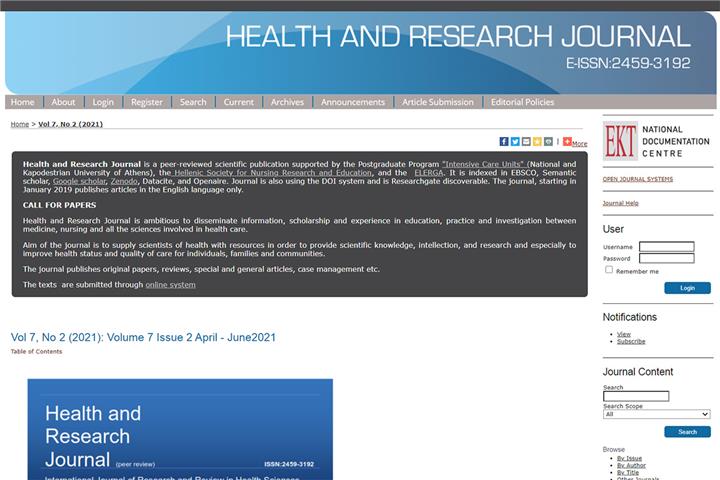
22/4/2021
Health & Research Journal
Health & Research journal. Health and Research Journal is a peer-reviewed ...
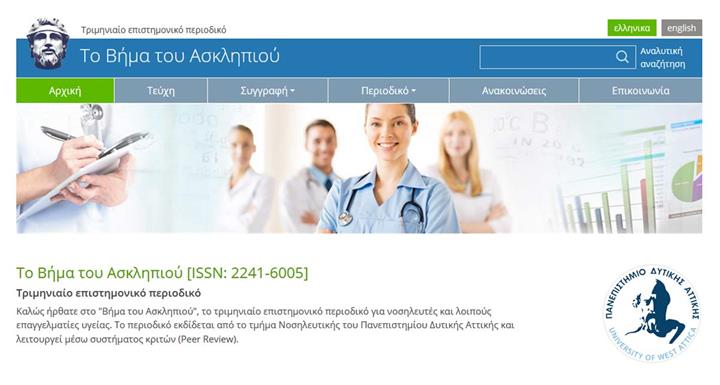
1/4/2021
Information about the new site
Welcome to the new and renewed website of the journal, which this year completes ...
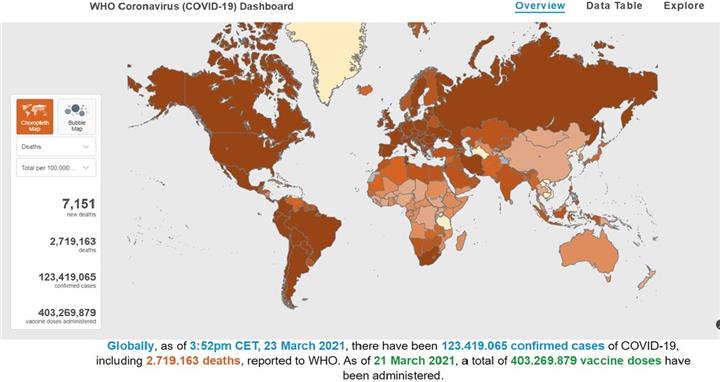
24/3/2021
WHO Coronavirus (COVID-19) Dashboard
Watch here the aggregated data from WHO observatory, on Covid-19 disease.
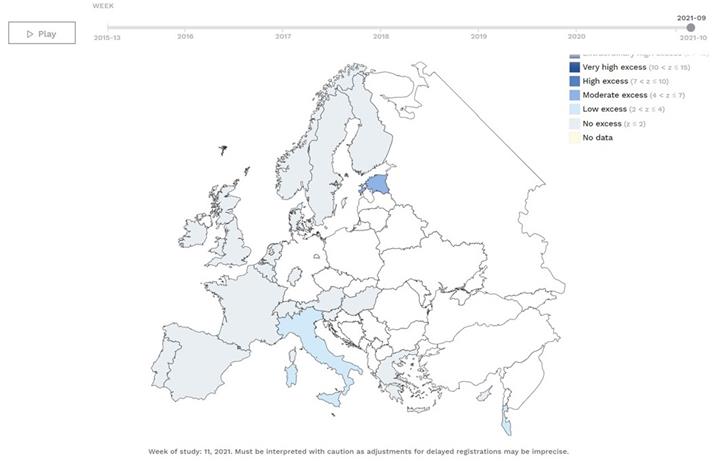
24/3/2021
European mortality monitoring activity
EuroMOMO is a European mortality monitoring activity, aiming to detect and measure ...
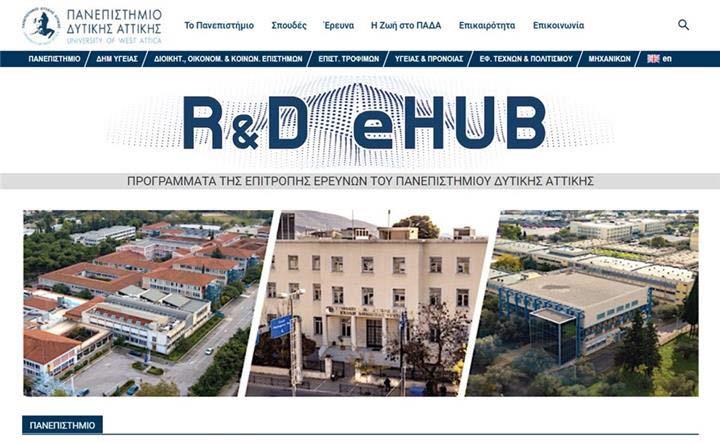
6/3/2021
University of West Attica Research Committee Projects
You can find more details here.
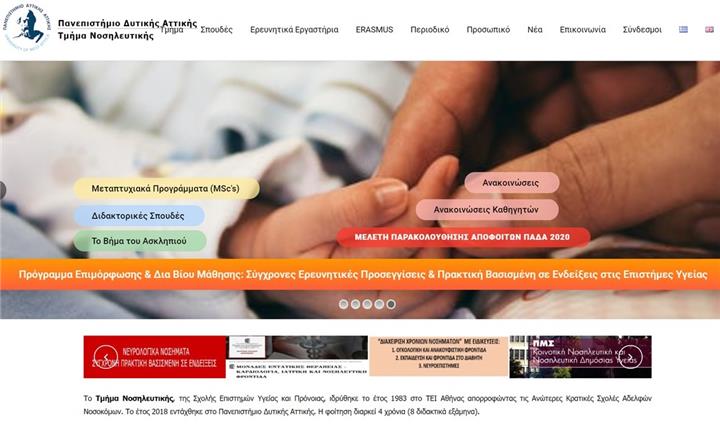
1/3/2021
Department of Nursing, University of West Attica
Get to know the Department of Nursing, University of West Attica and its activities.